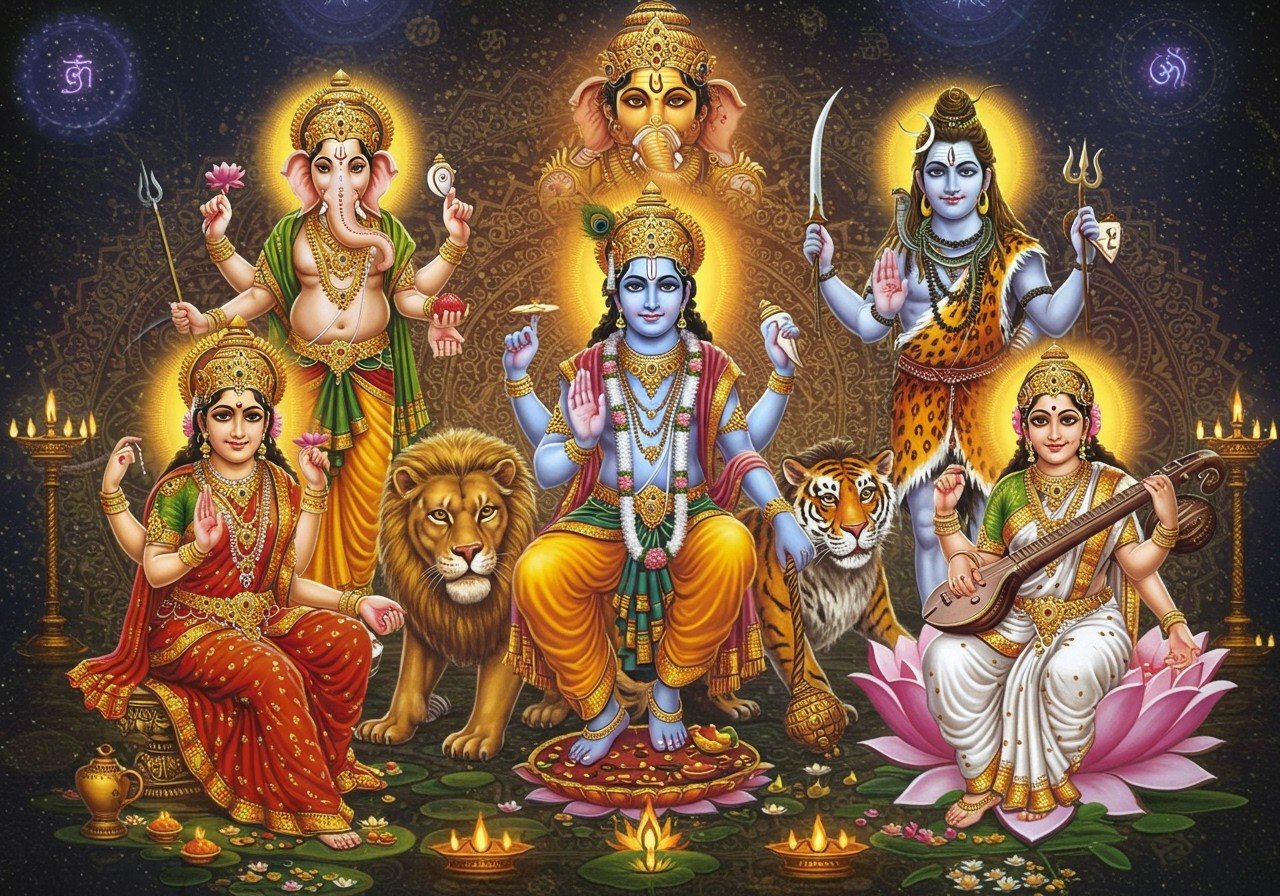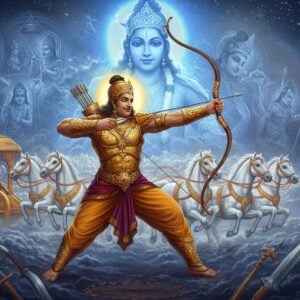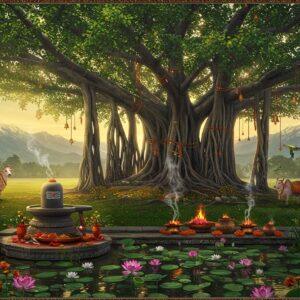Exploring the Divine: Understanding Devatas in Hinduism

In the rich tapestry of Hindu spirituality, Devatas hold a significant place as revered divine beings. These deities are not merely figures of worship but embody various facets of life, nature, and spiritual principles. They play a vital role in the daily rituals and cultural fabric of millions across India, reflecting the enduring faith and values of diverse communities. This exploration delves into the different categories of Devatas, their significance, and how they continue to resonate in contemporary Hindu practices.
Understanding Devatas: More Than Just Gods
Devatas are divine entities in Hinduism, representing different forces of nature, virtues, and aspects of life itself. They are often categorized into groups like Grama Devata, Anga Devata, and Upasana Devata, each with unique roles in spiritual practices. The worship of Devatas has ancient roots, tracing back to the Vedic texts, demonstrating a long and rich history of devotion. Regional variations in their worship add to the vibrant tapestry of India’s cultural diversity. Depictions of Devatas in intricate art forms are imbued with symbolism. In contemporary society, Devatas continue to serve as embodiments of moral and ethical values.
Grama Devata: Guardians of the Community
In rural India, Grama Devatas are deeply revered as the protectors of villages and communities. These deities are believed to safeguard fields, homes, and families, ensuring prosperity and safety. Villagers honor them with grand festivals and elaborate rituals, fostering a strong sense of community and shared identity. These celebrations strengthen social bonds and reinforce the spiritual connection between the people and their divine protectors. Grama Devatas are often associated with agriculture and the natural cycles of life, reflecting their role in ensuring bountiful harvests and the overall well-being of the community. Their blessings are sought for important events such as marriages and community gatherings, acknowledging their continued guardianship. Each region boasts unique stories and legends surrounding their Grama Devatas, often passed down through generations, preserving cultural heritage and local history. In urban settings, the role of Grama Devatas has evolved but their importance remains. Urban devotees often adapt traditional practices, keeping the essence of these beliefs alive even amidst the hustle and bustle of city life.
Anga Devata: Embodiments of Health and Well-being
Anga Devatas focus on the physical and mental well-being of individuals. Each deity is associated with a specific body part, symbolizing protection and healing. In Ayurveda, the traditional Indian system of medicine, Anga Devatas play a guiding role in holistic practices, reminding us of the interconnectedness between our physical bodies and the cosmos. Worshipping Anga Devatas involves specific rituals and mantras, invoking divine energy for healing and promoting harmony within oneself and with the natural world. The symbolism of Anga Devatas is profound, embodying the belief that individual health reflects the balance and harmony of the universe. Daily worship integrates these deities into spiritual routines, fostering both physical and mental well-being.
Upasana Devata: Guides on the Spiritual Path
Upasana Devatas serve as personal guides on individual spiritual journeys. They support seekers in their pursuit of peace, self-discovery, and enlightenment. Through meditation and devoted practices, devotees connect with these chosen deities, deepening their spiritual understanding. Bhakti, or devotion, is central to Upasana practices, nurturing a deep and personal bond with the divine. Dhyana, or meditation, complements bhakti by calming the mind and fostering inner stillness. Upasana Devatas manifest in various forms, catering to the unique spiritual needs of each individual. Worship of these deities can be transformative, encouraging self-realization, personal growth, and a deeper connection to the divine.
The Role of Devatas in Modern Hinduism
Devata worship remains deeply relevant in contemporary Hinduism, bridging ancient traditions with modern life. It fosters a sense of identity, strengthens community bonds, and provides a link to cultural heritage, particularly for diaspora communities. Digital platforms and online resources have made rituals and information about Devatas more accessible globally, reflecting a renewed interest in preserving and understanding these traditions. Devata worship has also intersected with contemporary social causes, aligning with values of environmental conservation and ethical living. This evolution demonstrates the adaptability and enduring relevance of Hinduism in the modern world. Explore Hinduism: Core Beliefs and Practices provides further insight into these dynamic traditions.
Major Deities in Hinduism: A Glimpse into the Divine Pantheon
Hinduism embraces a vast and diverse pantheon of gods and goddesses, each with unique roles and attributes. While seemingly polytheistic, Hinduism acknowledges a single Supreme Being, Brahman, from which all other deities emanate. These gods and goddesses are seen as manifestations of Brahman, allowing devotees to connect with the divine in a personal and meaningful way.
- Brahma: The Creator: Responsible for bringing the universe into existence, Brahma is a member of the Trimurti, the Hindu Trinity. His consort is Saraswati, the goddess of knowledge and arts. Brahma’s creative power is celebrated through various hymns and rituals.
- Vishnu: The Preserver: Vishnu maintains cosmic order and upholds Dharma, the righteous path. Also a member of the Trimurti, Vishnu is believed to incarnate in various forms, such as Rama and Krishna, to restore balance and guide humanity. His consort is Lakshmi, the goddess of prosperity and good fortune.
- Shiva: The Destroyer: Shiva represents transformation and the cycle of creation and destruction. As the third member of the Trimurti, Shiva’s role is essential for renewal and rebirth. He is also revered as the master of dance and regeneration. His consort is Parvati, also known as Shakti or Devi, representing divine feminine energy.
- Devi: The Divine Feminine: Also known as Shakti, Devi embodies the primordial feminine energy, considered the source of all creation. She is sometimes worshipped through other goddesses like Parvati, Durga, and Kali, each representing different aspects of her power. Devi’s worship is central to many Hindu traditions, celebrating the feminine principle as the dynamic force behind the universe. You can find various items related to Devi worship at Poojn.in.
- Lakshmi: Goddess of Prosperity: Lakshmi embodies wealth, fortune, beauty, and auspiciousness. As Vishnu’s consort, she plays a vital role in maintaining cosmic harmony and blessing devotees with abundance. Lakshmi’s worship is particularly prominent during festivals like Diwali, celebrating prosperity and new beginnings. Explore Lakshmi idols and puja items on Poojn.in.
- Saraswati: Goddess of Knowledge: Saraswati presides over knowledge, music, arts, and wisdom. As Brahma’s consort, she represents the creative power of knowledge and its importance in spiritual and intellectual growth. Students and artists often invoke Saraswati’s blessings for inspiration and success.
- Parvati: Embodiment of Love and Devotion: Parvati symbolizes love, devotion, and fertility. As Shiva’s consort, she represents the nurturing and compassionate aspect of the divine. Parvati is often worshipped in her various forms, including Durga and Kali.
- Ganesha: Remover of Obstacles: Ganesha is widely revered as the remover of obstacles and the god of new beginnings. He is easily recognized by his elephant head and is often invoked before undertaking any new endeavor. Ganesha is the son of Shiva and Parvati and is celebrated for his wisdom and benevolent nature.
- Durga: The Protector: Durga is a powerful mother goddess who embodies strength and protection. Often depicted riding a lion, Durga is revered for her ability to vanquish evil and safeguard her devotees. She is particularly worshipped during the festival of Navratri.
- Hanuman: Devotion and Strength: Hanuman, the monkey god, is revered for his unwavering devotion to Lord Rama and his immense strength. He is a symbol of courage, loyalty, and selfless service. Hanuman’s worship is widespread, and he is often invoked for protection and strength. You can explore various Hanuman puja items at Poojn.in.
These deities, while possessing distinct personalities, are ultimately considered aspects of the same divine reality, Brahman. The concept of equivalence is cherished in Hinduism, with deities like Harihara (half Vishnu, half Shiva) and Ardhanarishvara (half Shiva, half Parvati) visually representing this interconnectedness. Learn more about Hindu Gods and Goddesses.
Poojn.in: Your Spiritual Companion
Poojn.in, India’s leading online store for cultural and spiritual goods, offers a wide range of products to support your devotional practices. From meticulously crafted idols to authentic puja samagri, Poojn.in provides everything you need to create a sacred space in your home. Discover a diverse selection of high-quality items for honoring deities like Maa Durga, Devi Saraswati, and Goddess Lakshmi. Create Your Sacred Home Space with Poojn.in provides valuable guidance on setting up your personal puja altar.
Poojn.in is committed to providing authentic and high-quality products, ensuring a fulfilling spiritual experience for all its customers. With convenient online shopping and doorstep delivery across India, Poojn.in makes it easy to access the items you need for your devotional practices. Their dedicated customer service team offers guidance on the proper usage of puja items, ensuring that you have the support you need on your spiritual journey. Visit Poojn.in today and explore their extensive collection.
Embracing the Devatas: A Path to Harmony and Understanding
The world of Devatas offers a rich and insightful spiritual path, bridging ancient wisdom with contemporary life. These deities, each with their unique significance, serve as guides and protectors on our life journeys. Whether in rural villages or bustling cities, Devatas continue to offer protection, healing, and opportunities for spiritual growth. By honoring Grama Devatas, we celebrate community and the enduring power of tradition. Through Anga Devatas, we nurture our physical and mental well-being. With Upasana Devatas, we embark on personal quests for self-discovery and enlightenment. Each type of Devata enriches our lives, providing wisdom, support, and a deeper connection to the divine. In today’s world, embracing Devata worship offers a profound way to connect with our roots while navigating the complexities of modern life. By adapting and understanding these traditions, we ensure their continued relevance for generations to come. The journey with Devatas is a path of respect, learning, and inner peace, a journey that welcomes all who seek balance, harmony, and a deeper understanding of themselves and the universe.


